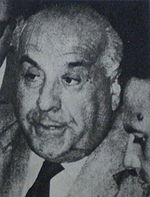
Elías Sapag
Encyclopedia

Lebanon
Lebanon , officially the Republic of LebanonRepublic of Lebanon is the most common term used by Lebanese government agencies. The term Lebanese Republic, a literal translation of the official Arabic and French names that is not used in today's world. Arabic is the most common language spoken among...
-born Argentine
Argentina
Argentina , officially the Argentine Republic , is the second largest country in South America by land area, after Brazil. It is constituted as a federation of 23 provinces and an autonomous city, Buenos Aires...
politician, long-serving senator for Neuquén Province
Neuquén Province
Neuquén is a province of Argentina, located in the west of the country, at the northern end of Patagonia. It borders Mendoza Province to the north, Rio Negro Province to the southeast, and Chile to the west...
, founder of the Neuquén People's Movement and head of the locally influential Sapag family.
Sapag was born in Mayrouba, in the Keserwan District
Keserwan District
Keserwan is a district in the Mount Lebanon Governorate , Lebanon, to the northeast of the Lebanon's capital Beirut...
, Lebanon
Lebanon
Lebanon , officially the Republic of LebanonRepublic of Lebanon is the most common term used by Lebanese government agencies. The term Lebanese Republic, a literal translation of the official Arabic and French names that is not used in today's world. Arabic is the most common language spoken among...
, and emigrated with his parents to Argentina in 1913. They arrived in Zapala
Zapala
Zapala is a city in the Patagonian province of Neuquén, Argentina with about 32,000 inhabitants according to the .The city is located at the geographic center of the province at the confluence of national and provincial roads, on a route to the Andes and Chile...
, Neuquén, where his grandfather had already set up home, and moved on to Zapala
Zapala
Zapala is a city in the Patagonian province of Neuquén, Argentina with about 32,000 inhabitants according to the .The city is located at the geographic center of the province at the confluence of national and provincial roads, on a route to the Andes and Chile...
. His parents had several more children, including his brothers Felipe
Felipe Sapag
Felipe Sapag was an Argentine politician, governor of Neuquén Province on five occasions and a leading figure in the Neuquén People's Movement and the locally influential Sapag family.-Life and times:...
, Amado and José. The family were successful in business, but the 1930 economic collapse brought great hardship. Sapag and his brothers were forced to give up their education to work to support the family and they moved to Cutral Có
Cutral Có
Cutral Có is a city in the Confluencia Department of Neuquén Province in Argentina. It is part of the statistical area formed with neighboring Plaza Huincul....
to set up a company. He and his brothers played leading roles in the community, and became leading Peronist activists. Elías chaired the Settlement Committee (Comisión de Fomento) of the town whilst Felipe was secretary, helping newcomers to settle in the new town. Felipe later became the first mayor of Cutral-Có, and Amado became mayor of Zapala.
Following the military coup d'etat
Coup d'état
A coup d'état state, literally: strike/blow of state)—also known as a coup, putsch, and overthrow—is the sudden, extrajudicial deposition of a government, usually by a small group of the existing state establishment—typically the military—to replace the deposed government with another body; either...
and the banning of the Peronist movement, Sapag and his brothers founded the Neuquino People's Movement, a provincial political party able to contest elections. Originally called 'Provincial Politics', it came into being on June 4, 1961, and Elías became party president. He was elected to the Argentine Senate
Argentine Senate
The Argentine Senate is the upper house of the Argentine National Congress. It has 72 senators: three for each province and three for the Autonomous City of Buenos Aires...
in 1963, whilst Felipe was elected Governor of Neuquén and would serve on four further occasions until the 1990s.
Having been deposed by the military in 1966, Elías Sapag was re-elected to the Senate in 1973, and returned to Congress in 1983 upon the restoration of democracy, serving until his death in 1993. He was one of Argentina's longest-serving senators.
Sapag married Alma Cavallo, and they had seven children. His son Rodolfo 'Pipe' Sapag succeeded him as senator, his daughter, Luz Sapag
Luz Sapag
Luz María Sapag was an Argentine politician, Mayor of the city of San Martín de los Andes and formerly a Senator representing the Neuquén Province under the aegis of the Neuquino People's Movement....
, was next to become a senator herself, whilst another son Jorge
Jorge Sapag
Jorge Augusto Sapag is a politician and lawyer, a member of the Neuquino People's Movement and governor of Neuquén Province since 2007....
served as vice-governor and from 2007 as governor of Neuquén.

